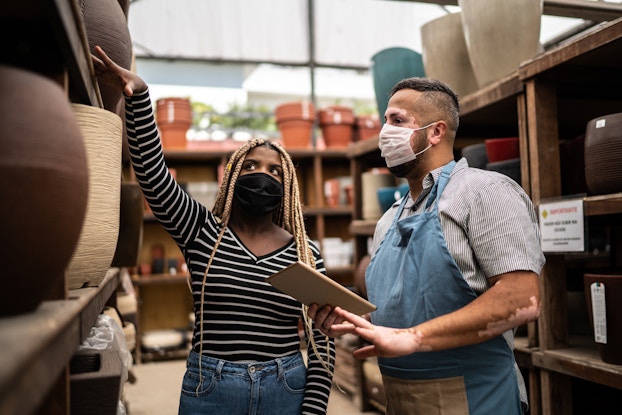
Throughout the COVID-19 pandemic, few groups have been more supportive and helpful to small business owners than their fellow entrepreneurs. Whether they were shut down completely or had to shift their operations to meet state regulations, many local businesses have collaborated with each other or offered their time and resources to support one another and try to keep each other afloat.
Below are five inspiring examples of businesses that have lent a hand to other small businesses as they navigate the current public health and economic crises together.
Black Innovation Alliance
This past March, a group of Black business leaders had planned to meet up at SXSW in Austin to discuss increasing Black ownership through equitable participation in the innovation economy. Although the highly anticipated industry conference was canceled due to COVID-19, this motivated group redirected its efforts into the virtual realm and launched the Black Innovation Alliance (BIA).
According to BIA's website,the Alliance exists to strengthen the ecosystem that cultivates Black entrepreneurs, innovators and creative technologists. Co-convenors Kerry Bowie of Msaada Partners and Preston L. James of DivInc said that BIA and its members have been engaging with each other via Notion, Slack, Zoom and other applications to stay professionally and socially connected.
"In a sense, this challenge was actually an opportunity, as it allowed us to increase the size of our tent as some physical and financial restrictions associated with space and travel were lifted," Bowie told CO—.
To support fellow Black entrepreneurs and innovators, BIA has been showcasing the work of the individual leaders of its Innovator Support Organizations (ISOs) on social media and other media outlets. Every organization in BIA is committed to lifting up the underappreciated and underfunded businesses led by people of color.
"Our dual crises of the day—a healthcare pandemic and a police brutality epidemic—make it imperative that we continue to market and grow BIA not in spite of, but specifically because of the current climate," said James. "America not only needs to know about these amazing people who are on the ground, in the trenches, doing the work with Black tech founders, small business owners and creatives, but America needs to support them."
[Read more: 6 Steps Toward Hiring and Fostering a Diverse Team]
EnrichHER
Data has shown that the COVID-19 pandemic disproportionately affected women-led and Black-owned businesses. Upon learning this, Dr. Roshawnna Novellus, CEO of EnrichHER and Black Innovation Alliance ISO, asked herself how she continue to support businesses with women and Black people in leadership positions. Her funding and networking platform had been focused on women-led startups and tech companies, but she wanted to broaden her focus to help more small businesses across more industries and stages of growth.
To that end, Novellus recently launched All Rise Factory, EnrichHER's new program for funders who want to support vetted women, Black and POC founders who have been in business for at least a year.
"I focus on founders who belong to underrepresented and underinvested groups in their respective industries," she said.
Novellus reminded her fellow business owners that there are countless ways to support other small businesses at this time, including purchasing gift cards to local stores, promoting small businesses on social media and sharing supplies with businesses in your area that are reopening.
"Whatever you choose, it is important to remember that success is greater when we support each other," Novellus said.
"This is a once-in-a-century opportunity to not only make a profit, but make a difference."
John Cho, founder of My Pet Child
My Pet Child
Across the country, pet adoptions skyrocketed during COVID-19 as quarantining families sought to bring a new companion into their homes. Unfortunately, some pet owners who lost their jobs found themselves struggling to care for their four-legged friends.
John Cho founded pet resource website My Pet Child in response to that financial struggle.
"Pet owners were having trouble keeping pets fed and affording vet bills, and sadly many had to make the difficult choice to surrender their pets," Cho said. "I have a background in digital marketing and saw an opportunity to help out as many people and animals as possible."
Cho contacted rescue organizations, vet offices, pet food stores and other pet-related businesses and found that many were eager to help or knew of grants and charities to help owners keep their beloved pets.
"As a marketer I knew that this could be beneficial for everyone involved," he explained. "Businesses and charities would get more exposure, donors and customers through my website and word-of-mouth from those they have served, and pet owners would get to keep their pets healthy, fed and housed in loving homes."
Today, Cho is working to expand the My Pet Child network, especially in more rural areas. Once organizations join My Pet Child, they can be found through its one-stop database, and in turn find other organizations to collaborate with.
"There is an urgent and growing need for pet food, supplies and affordable vet care … and there are plenty of people willing to share these services—but that only helps if pet owners know these resources exist," said Cho. "We are really pushing My Pet Child in digital spaces, social media and advertising so pet owners know there are options other than surrendering their pets. This is a once-in-a-century opportunity to not only make a profit, but make a difference."
[Read more: 8 Small Business Trends That Are the New Normal]
PTPioneer
The fitness industry took a major hit in 2020 as gyms and studios across the country were forced to stop offering in-person workouts. Tyler Read, CEO of PTPioneer, has been focused on helping other fitness-related businesses pivot their traditionally in-person businesses online.
"Personal trainers and small fitness studios have been hit particularly hard by COVID-19 and many have had little to no online presence at all," Read said. "We started stepping up our focus on teaching them how to … start getting clients online."
PTPioneer has been offering social media and website training for the fitness businesses it works with. Thanks to this training, Read's clients have learned how to set up and offer virtual services as an alternative to in-person sessions.
To manage the hardships brought on by the pandemic, Read urged struggling fitness entrepreneurs to focus on what they're best at in their own business that is still bringing in revenue.
"In this time when we're all scrambling to get by personally and in business, don’t stretch yourself too thin by trying to perfect a new skill or strategy," he said.
TeamBuilding
Before the pandemic, Michael Alexis made a successful living facilitating in-person team-building activities for corporate groups and organizations through his company, TeamBuilding. In early March, the business dropped to nearly zero revenue in three days and made the difficult decision to initiate layoffs.
"As we searched for new revenue sources, we also thought deeply about how we wanted to support other businesses during this time," said Alexis. "Virtual team building was both an intuitive addition to our offerings, and also something that could be of service."
Alexis and his remaining team quickly began offering virtual events like online office games, "tiny campfires" with mini s'mores kits sent to team members' homes and murder mystery activities. After one of TeamBuilding's first virtual events, a guest shared that the experience made them "forget everything that is going on in the world right now."
"That one piece of feedback helped us realize that this isn’t just providing fun, or opportunity for bonding; it's helping people feel normal in a period that deeply needs it," Alexis told CO—.
Since TeamBuilding pivoted toward virtual events, it has not only recovered and exceeded its previous monthly revenue, but has been able to rehire all laid-off team members and make new hires. The company has also found additional ways to help and support other organizations, like launching a self-funded grant program that provides subsidized services to nonprofits and educational institutions, and sharing its newfound knowledge and expertise in remote team building.
"We published a list with dozens of free virtual team-building activities to try," said Alexis. "This resource has helped tens of thousands of organizations get started with finding ways to keep engagement high while their teams work from home."
[Read more: Starting Over? How to Write a Business Plan for a Post-Pandemic World]
CO— aims to bring you inspiration from leading respected experts. However, before making any business decision, you should consult a professional who can advise you based on your individual situation.
Follow us on Instagram for more expert tips & business owners’ stories.
CO—is committed to helping you start, run and grow your small business. Learn more about the benefits of small business membership in the U.S. Chamber of Commerce, here.
Join us for our Small Business Day event!
Join us at our next event on Wednesday, May 1, at 12:00 p.m., where we’ll be kicking off Small Business Month alongside business experts and entrepreneurs. Register to attend in person at our Washington, D.C., headquarters, or join us virtually!








